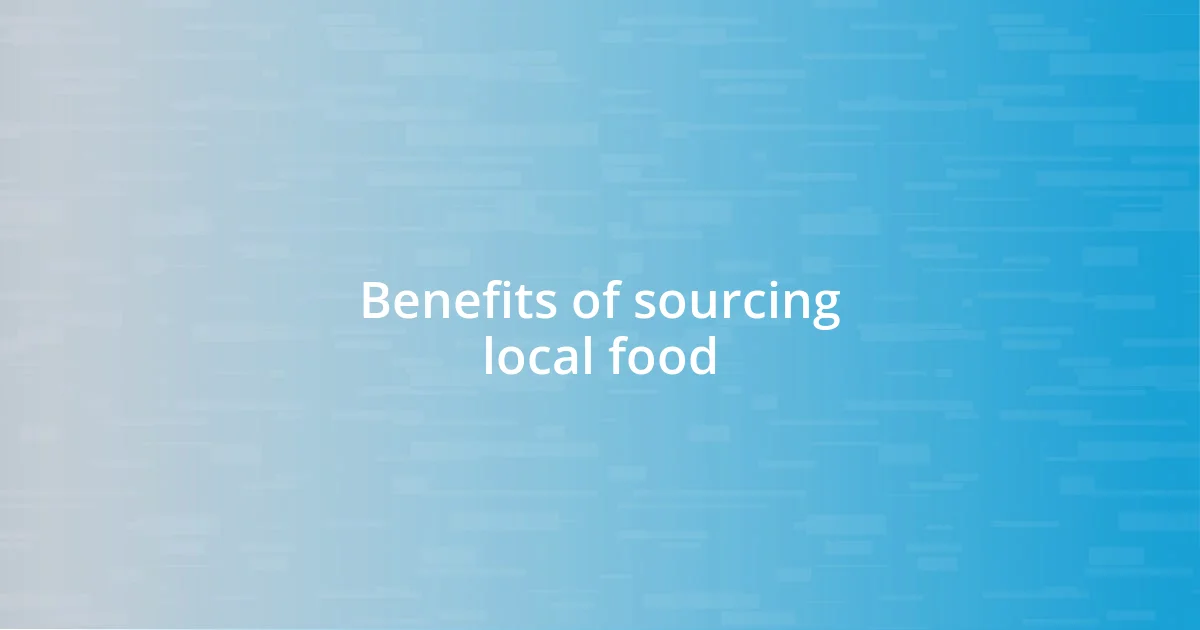Key takeaways:
- Local food sourcing enhances community connection and supports local economies, providing fresher, more nutritious options.
- It reduces environmental impact through shorter transportation distances, promoting sustainable farming practices.
- Challenges include seasonal availability and higher costs, but building relationships with local farmers and using technology can facilitate effective sourcing.

Understanding local food sourcing impacts
When I think about local food sourcing, I can’t help but recall a time I visited a farmers’ market. The vibrant colors, fresh smells, and the opportunity to chat with the growers really enhanced my appreciation for where my food comes from. Isn’t it fascinating how knowing the source of our food can deepen our connection to it?
The impacts of local food sourcing extend beyond just delicious tastes; they ripple throughout our communities. Supporting local farmers not only strengthens the local economy but also fosters relationships that promote sustainability. I often wonder, how sometimes just one meal, made with locally sourced ingredients, can feel like a collective effort, bringing together the entire community.
Moreover, I’ve noticed that when I choose local foods, I often find myself more mindful about my eating habits. Local produce tends to be fresher and more nutritious, contributing to a healthier lifestyle. Have you ever thought about how your food choices can influence your well-being just by opting for what’s grown nearby? It’s truly eye-opening to realize that our decisions can echo through our health, environment, and economy.

Benefits of sourcing local food
Sourcing local food brings a multitude of benefits that can be personally transformative. When I first started buying from local farmers, I was struck by the flavors of the produce – they were brighter, fresher, and more vibrant than what I used to find in the grocery store. This experience made me realize how much better my meals can be when I support local growers. Whenever I prepare a dish with ingredients straight from the farm, there’s a sense of pride knowing I’m not just feeding myself, but also contributing to my community’s vitality.
Another compelling benefit of local food sourcing is the reduced environmental impact. I’ve learned that food traveling shorter distances means less fuel is consumed, leading to lower carbon emissions. Whenever I think about the greenhouse gases generated by long-haul transportation, it feels empowering to choose local, as if I’m making a small but significant step toward environmental stewardship. It’s not just about food; it’s about participating in a larger movement for a healthier planet.
The economic boost that local food sourcing provides cannot be understated. Investing in local farmers creates jobs and keeps money circulating within the community. Each time I purchase a basket of fresh produce, I feel connected to the hands that toiled in the soil. It’s a reminder that my choices have power, and supporting local farms is my way of nurturing the local economy. Each purchase is like a vote of confidence in my community.
| Benefit | Description |
|---|---|
| Freshness | Local food is often harvested at peak ripeness, leading to better flavors and nutrients. |
| Environmental Impact | Reduced transportation means lower carbon footprints and a healthier planet. |
| Economic Support | Purchasing locally helps keep money in the community and fosters job creation. |

Economic advantages of local sourcing
Supporting local food sourcing goes beyond just taste; it significantly bolsters our local economies. I remember attending a community dinner where we all shared dishes made with ingredients sourced right from our town. It was heartwarming to see how those meal preparations not only relied on local farmers but also fostered job opportunities in restaurants and markets. It made me realize that each dollar spent on local food ripples through our community, creating a cycle of economic empowerment.
- Job Creation: Local sourcing helps create and maintain agriculture and food-related jobs in the community.
- Quicker Returns for Farmers: Farmers keep a larger share of the profits, leading to more stable income.
- Reduced Food Prices: By sourcing locally, consumers may benefit from lower prices due to reduced transport costs.
- Increased Local Investment: Money spent locally tends to be reinvested in the community, enhancing overall economic resilience.
When I think about the economic advantages of buying local, I feel a sense of joy in knowing my choices contribute to a thriving community. Just last summer, I visited a farm where they not only produce food but also offer workshops. The farmer mentioned how local customers enable them to hire more seasonal help. That connection makes it easy to feel invested in their success, and honestly, it’s a beautiful cycle of support and growth that I’m proud to be part of.

Environmental benefits of local food
One of the most striking environmental benefits of sourcing local food is its tremendous impact on reducing waste. I recall visiting a local farm and learning about their waste management practices. They minimize excess packaging by selling produce directly to consumers, significantly cutting down on the plastic and cardboard that usually accompany long-distance food distribution. Isn’t it inspiring to realize that buying local can directly reduce the clutter in our landfills?
Moreover, local food systems often have the advantage of encouraging sustainable farming practices. When I first got to know a local farmer, she was proud to share how she used organic methods and crop rotation techniques. Knowing that my food was grown without harmful pesticides made each bite feel safer and healthier. I’ve come to appreciate how supporting these practices fosters biodiversity and healthier soil, which not only benefits the farm but the entire ecosystem.
Finally, I’ve found that local food sourcing helps preserve the natural landscape of a community. During a visit to a nearby farm, I was struck by the verdant fields and orchards that had been maintained for generations. Supporting these farms not only nourishes our bodies but also safeguards land from industrial development. It made me think, how can we prioritize our local landscapes while enjoying the freshest ingredients? Each choice to eat locally feels like a collective step toward protecting the green spaces we cherish.

Community engagement through local sourcing
Engaging with local sourcing cultivates a vibrant community spirit. I remember one Saturday morning at the farmers’ market, where a group of neighbors gathered not just to shop but to chat with the vendors. The laughter and stories exchanged created a sense of belonging that commercial stores often lack. Isn’t it wonderful how food can bridge gaps and connect us to one another?
Participating in community-supported agriculture (CSA) programs has also deepened my connection with local food producers. When I signed up for a share, I felt excited, knowing I was part of something bigger. Each weekly delivery of fresh produce felt like receiving a little piece of my community. It reinforced my understanding that every bite I took was a testament to the hard work of local farmers, making the act of eating feel like a celebration of shared effort.
Moreover, hosting potlucks featuring local ingredients has opened up dialogues about food sourcing and its importance. I recently organized one, and it was incredible to see how many people were curious and passionate about where their food comes from. Sharing those dishes sparked conversations about supporting local businesses, fostering a collective awareness that every meal can be an opportunity for positive change. What better way to inspire action than to come together around a table filled with locally sourced goodness?

Challenges in local food sourcing
Sourcing local food comes with its own set of challenges that we cannot overlook. For instance, I’ve encountered issues like seasonal availability. During a winter visit to my favorite local farm, I was reminded of how few options there were compared to summer. The disappointment was palpable when all I could find were root vegetables. It made me wonder, do I truly understand what it takes for farmers to grow and provide food year-round?
Another challenge I’ve faced is the often higher cost associated with local products. I remember walking through a farmer’s market and seeing that a dozen eggs from a local farm were nearly double the price of those at the grocery store. This raised questions in my mind: Is quality really worth the price differential? For me, the answer lies in the assurance of freshness and ethical farming practices, but I realize that not everyone can stretch their budget in this way.
Transportation and distribution can complicate local food sourcing as well. When visiting a newly opened local co-op, I learned how tricky it can be for smaller farms to maintain reliable delivery schedules to meet customer demand. It was eye-opening to hear the farmers discuss logistical hurdles. I thought, when was the last time I considered the journey my food makes from farm to table? Understanding these challenges enriches my appreciation for the effort and dedication behind every local meal.

Strategies for effective local sourcing
One effective strategy for local sourcing is to build strong relationships with farmers and producers. I once took the time to visit a few local farms, engaging with the owners and learning about their practices firsthand. This connection transformed my shopping experience; every time I bought produce, it felt less like a transaction and more like a shared commitment to support our local economy. Have you ever chatted with a farmer about their challenges? It opened my eyes to the dedication that goes into every crop.
Another strategy involves creating a community network to facilitate sharing resources and knowledge among residents. I remember a neighborhood gathering where we discussed starting a local food co-op. This collective effort promised not only to streamline sourcing but also to educate each other on seasonality and availability. When community members come together to share their experiences, it fosters an understanding of how our choices impact local farmers and our environment. Isn’t it empowering to know that we can make a difference together?
Lastly, adopting innovative technology can enhance local sourcing efforts. I recently discovered an app that connects consumers directly with local farmers, allowing for easy ordering and delivery. This technological approach made it so convenient to access fresh produce while supporting the people who grew it. I often think about how much easier it’s become for all of us to make informed choices. Have you tried them? Embracing these tools can significantly simplify the process of sourcing local food, making it a win-win for everyone involved.
















